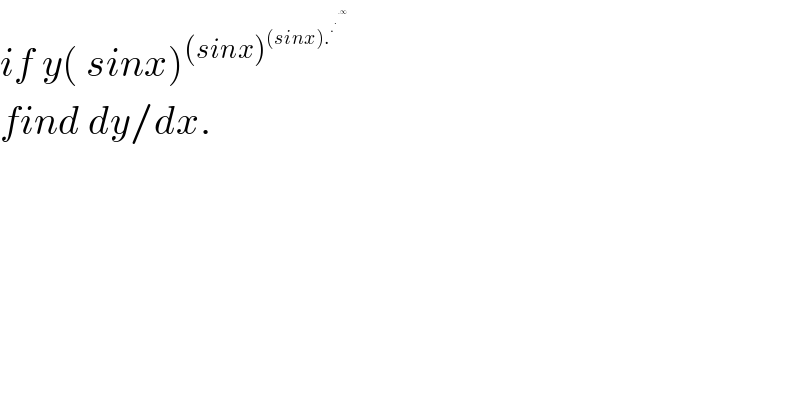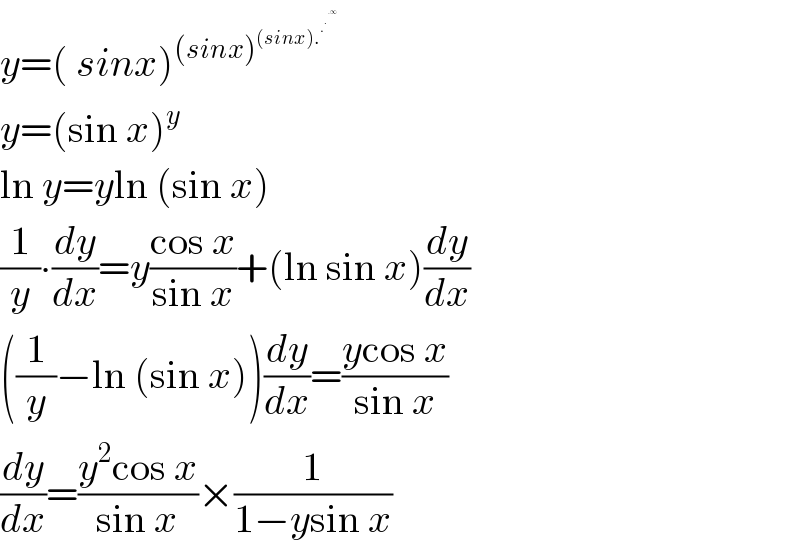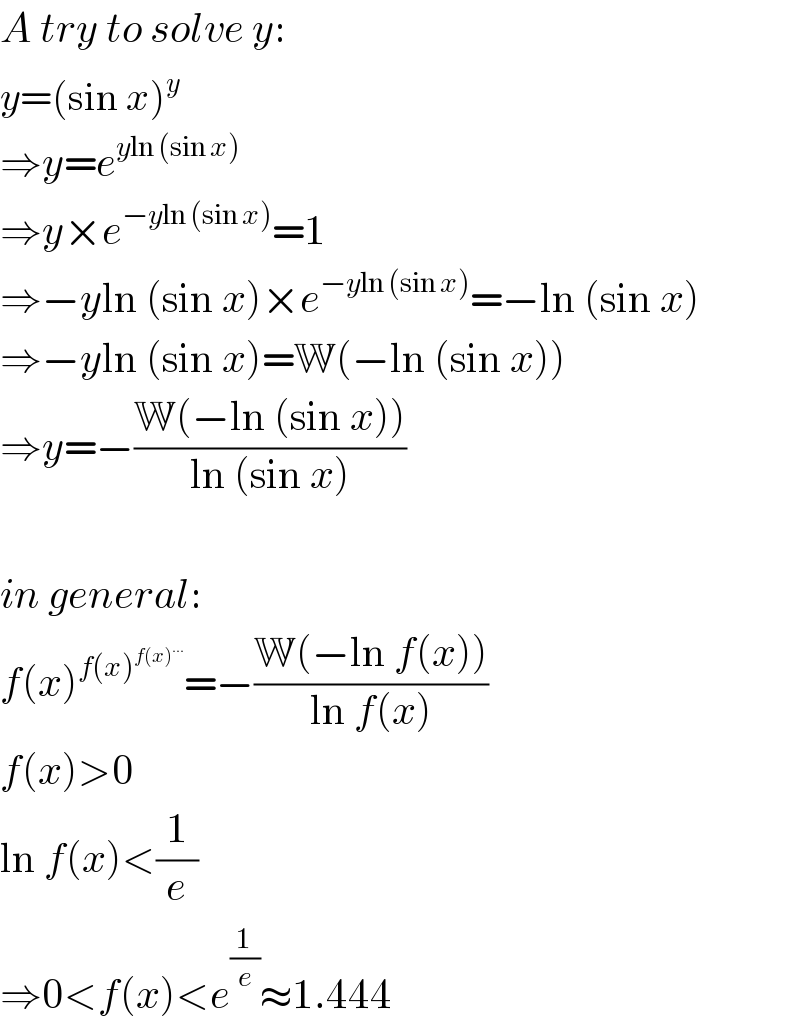
Question Number 25567 by rita1608 last updated on 11/Dec/17

$${if}\:{y}\left(\:{sinx}\right)^{\left({sinx}\right)^{\left({sinx}\right).^{.^{.^{.\infty} } } } } \\ $$$${find}\:{dy}/{dx}. \\ $$
Commented by prakash jain last updated on 11/Dec/17

$$\:{y}=\left(\:{sinx}\right)^{\left({sinx}\right)^{\left({sinx}\right).^{.^{.^{.\infty} } } } } ? \\ $$$$ \\ $$
Answered by prakash jain last updated on 11/Dec/17

$${y}=\left(\:{sinx}\right)^{\left({sinx}\right)^{\left({sinx}\right).^{.^{.^{.\infty} } } } } \\ $$$${y}=\left(\mathrm{sin}\:{x}\right)^{{y}} \\ $$$$\mathrm{ln}\:{y}={y}\mathrm{ln}\:\left(\mathrm{sin}\:{x}\right) \\ $$$$\frac{\mathrm{1}}{{y}}\centerdot\frac{{dy}}{{dx}}={y}\frac{\mathrm{cos}\:{x}}{\mathrm{sin}\:{x}}+\left(\mathrm{ln}\:\mathrm{sin}\:{x}\right)\frac{{dy}}{{dx}} \\ $$$$\left(\frac{\mathrm{1}}{{y}}−\mathrm{ln}\:\left(\mathrm{sin}\:{x}\right)\right)\frac{{dy}}{{dx}}=\frac{{y}\mathrm{cos}\:{x}}{\mathrm{sin}\:{x}} \\ $$$$\frac{{dy}}{{dx}}=\frac{{y}^{\mathrm{2}} \mathrm{cos}\:{x}}{\mathrm{sin}\:{x}}×\frac{\mathrm{1}}{\mathrm{1}−{y}\mathrm{sin}\:{x}} \\ $$
Commented by rita1608 last updated on 11/Dec/17

$${thank}\:{u}\:{sir} \\ $$
Commented by mrW1 last updated on 11/Dec/17

$${A}\:{try}\:{to}\:{solve}\:{y}: \\ $$$${y}=\left(\mathrm{sin}\:{x}\right)^{{y}} \\ $$$$\Rightarrow{y}={e}^{{y}\mathrm{ln}\:\left(\mathrm{sin}\:{x}\right)} \\ $$$$\Rightarrow{y}×{e}^{−{y}\mathrm{ln}\:\left(\mathrm{sin}\:{x}\right)} =\mathrm{1} \\ $$$$\Rightarrow−{y}\mathrm{ln}\:\left(\mathrm{sin}\:{x}\right)×{e}^{−{y}\mathrm{ln}\:\left(\mathrm{sin}\:{x}\right)} =−\mathrm{ln}\:\left(\mathrm{sin}\:{x}\right) \\ $$$$\Rightarrow−{y}\mathrm{ln}\:\left(\mathrm{sin}\:{x}\right)=\mathbb{W}\left(−\mathrm{ln}\:\left(\mathrm{sin}\:{x}\right)\right) \\ $$$$\Rightarrow{y}=−\frac{\mathbb{W}\left(−\mathrm{ln}\:\left(\mathrm{sin}\:{x}\right)\right)}{\mathrm{ln}\:\left(\mathrm{sin}\:{x}\right)} \\ $$$$ \\ $$$${in}\:{general}: \\ $$$${f}\left({x}\right)^{{f}\left({x}\right)^{{f}\left({x}\right)^{...} } } =−\frac{\mathbb{W}\left(−\mathrm{ln}\:{f}\left({x}\right)\right)}{\mathrm{ln}\:{f}\left({x}\right)} \\ $$$${f}\left({x}\right)>\mathrm{0} \\ $$$$\mathrm{ln}\:{f}\left({x}\right)<\frac{\mathrm{1}}{{e}} \\ $$$$\Rightarrow\mathrm{0}<{f}\left({x}\right)<{e}^{\frac{\mathrm{1}}{{e}}} \approx\mathrm{1}.\mathrm{444} \\ $$
Answered by ibraheem160 last updated on 11/Dec/17

